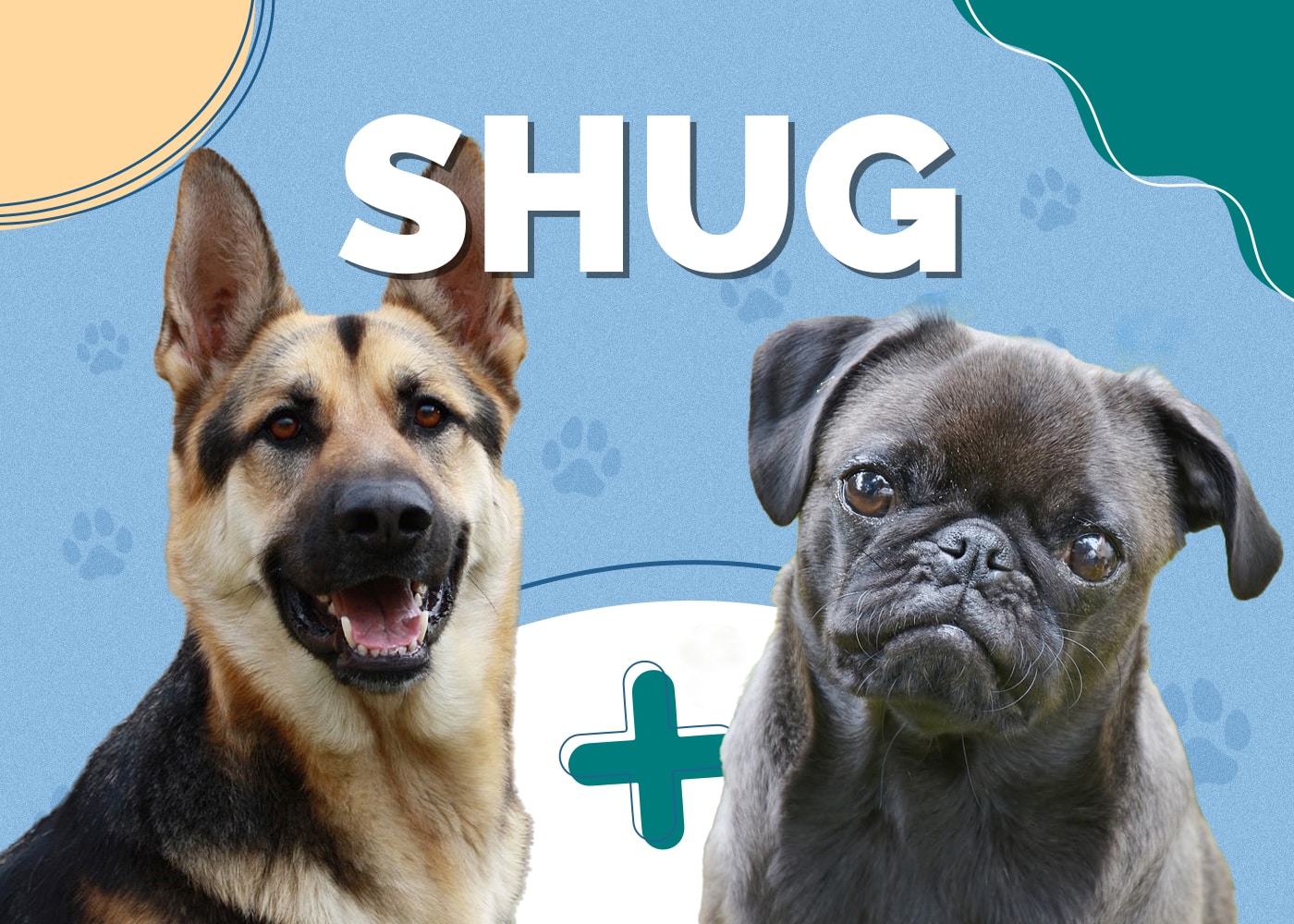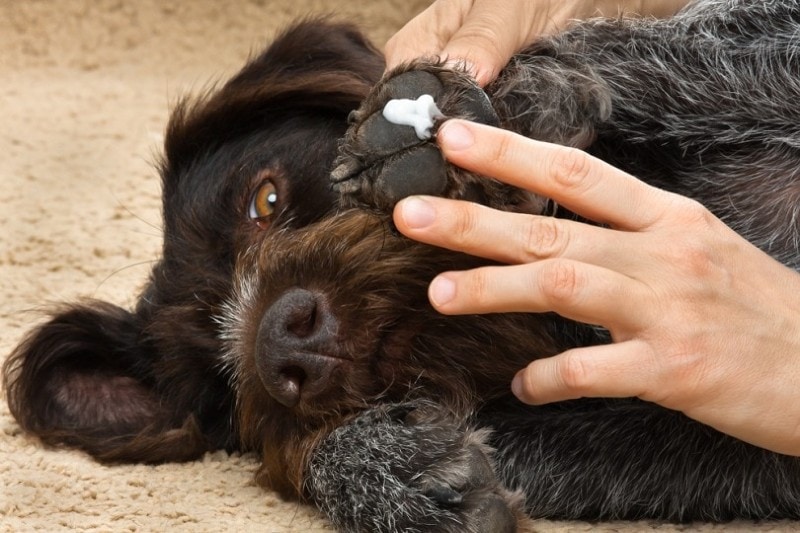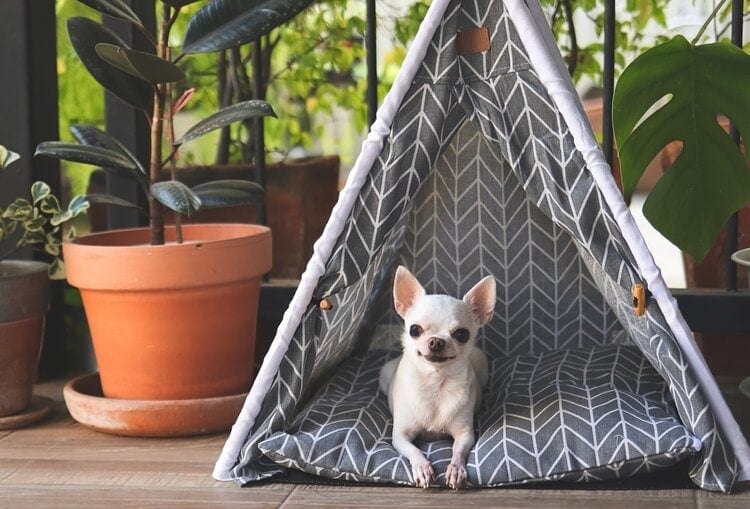Shug (German Shepherd & Pug Mix): Breed Info, Pictures & Care Guide
Updated on

Purebreds usually get the most attention in the dog world, but there are tons of lovable hybrids between unlikely dog breeds out there too. One of them is the Shug, which combines the appearance and personalities of two unlikely dog breeds.
Unlike pure breeds, the Shug’s appearance, health, and temperament depend on their parents’ genetics. As a result, no two Shugs will look exactly alike.
| Height: | Mini |
| Weight: | 15–50 pounds |
| Lifespan: | 12–15 years |
| Colors: | Cream, black, tan, white, brown |
| Suitable for: | Families with or without kids, apartment dwellers, new dog owners |
| Temperament: | Affectionate, loyal, bright, playful, clingy |
Also known as a German Shepherd Pug Mix, the Shug is an attempt to combine the goofy Velcro nature of Pugs with the more loyal, intelligent German Shepherd. They can have a very Pug-like face with a larger German Shepherd body or vice versa, or they may appear to be a roughly even mix of the two. Shugs can have either floppy Pug ears or erect German Shepherd ears, depending on pure genetic luck.
Most Shugs are born to female German Shepherds, who have an easier time giving birth than small Pugs.
Shug Breed Puppies
It’s difficult to find a litter of Shugs because they’re a very unlikely pairing in the dog world. You might be able to locate some by joining local dog owners’ groups on Facebook or other social media, checking out Craigslist, or specifically searching for Shugs on the web. They typically don’t cost as much as a purebred dog, but in some cases, you might have to travel some distance to find a Shug puppy.

Temperament & Intelligence of the Shug
Shugs are a cross between the zany, needy Pug and the fiercely intelligent and loyal German Shepherd. Sounds like the perfect mix, right? Shugs are less stubborn than Pugs and more trainable thanks to Shepherd DNA, with the right balance of playfulness. They’re moderately active dogs that need lots of mental stimulation. Both their parent breeds are known to be drooly chewers.
They get very attached to their owners and don’t really care for strangers. In fact, their territorial nature makes them great watchdogs. However, some Shugs take after Pugs more than German Shepherds and make fast friends with strangers. There’s really no telling what mix of the two breeds’ personalities you’ll get until you meet and interact with your Shug for the first time.
Are These Dogs Good for Families? 👪
Yes, Shugs make an ideal family dog. The intense German Shepherd disposition is tempered by the more laidback, fun-loving Pug, but you’ll have to observe how they interact with kids. Larger Shugs that take after Shepherds might play too rough and require close supervision, particularly with younger children. Shugs are attention seekers by nature, and they’ll grow to love every member of the family.
They love to follow people around, so make sure you watch out for them underfoot around the house!
Does This Breed Get Along with Other Pets?
Usually. Shugs aren’t as dominating as a pure German Shepherd and can get along with most dog breeds and even cats if they’re mellow enough. When you first bring your Shug home, it’s important for your other pets to have their space and to closely watch their first interactions. With luck, they’ll at least tolerate each other and maybe they’ll even grow to be friends in time.
Things to Know When Owning a Shug:
Food & Diet Requirements 🦴
Like any dog, the Shug needs a complete & balanced diet of dog food to grow up healthy and thrive. Dogs need a mix of protein, fat, carbs, and a slew of vitamins and trace minerals to stay healthy. Look for brands with at least 20% protein and avoid foods that are heavy on grains. Dogs generally do better with protein-heavy diets and fewer carbs.
For voracious eaters and overweight dogs, though, you can try reducing kibble portions a little and adding fiber-rich veggies like sweet potato or green beans.
Exercise 🐕
Shug energy levels can vary a lot, with some being as active as German Shepherds. As a good rule of thumb, they need about an hour of vigorous exercise per day to stay healthy and keep boredom at bay. You can adjust this based on how tired your dog gets, though. Some Shugs are more indoorsy couch potatoes that only need half an hour or so of regular exercise time.
Shugs also need lots of mental stimulation to keep their minds busy and reduce boredom-related anxiety and destructive chewing. You can’t just leave them with nothing to do! Some good chew toys, a puzzle feeder, and a tug-of-war rope should get any beginner dog owner ready to keep their Shug busy on the laziest afternoons.
Training 🎾
Shugs are much less airheaded than Pugs and more trainable like German Shepherds, but it helps to keep training sessions short to gauge their attention span. Most Shugs are very eager to please and do well with food and ample praise. Some Shugs might be more stubborn and resistant to training, but all you can do is stay patient and use positive reinforcement techniques.
Positive reinforcement roughly sums up to reinforcing good or desirable behavior in the mind of your dog by making them realize being good or obeying equal treats and attention. Rather than punishing or scolding for bad behavior, you ignore it and truck on. Some dogs take to training faster than others, so patience is key. Shugs are generally bright dogs, which makes them good for first-time dog owners.
Socialization is another major component of training, and it’s a critically short window: from 8 to 16 weeks, you should be exposing your Shug to all sorts of new places, people, sights, and animals. That helps them know what’s normal, how to behave in public, and what not to do in public.
Grooming ✂️
Shugs usually have short, dense coats and sometimes smoother fur from their Pug side. The good news is that their fur is easy to care for, and a weekly session with a good de-shedding comb should help remove the bulk of their dead hair. A good vacuum with a HEPA-rated filter is a must for homes with allergy sufferers and a good idea for any home, keeping animal hair and dander to a bare minimum.
Shugs moderately shed throughout the year, but keeping up with grooming should reduce that by a lot.
Health and Conditions 🏥
- Joint dysplasia: More common in old age and with big dogs like the German Shepherd, dysplasia is a painful arthritic condition that can limit mobility.
- Eye conditions: Shugs are prone to developing glaucoma and cataracts, potentially causing visual impairment or blindness.
- Respiratory problems: The flat face and unique anatomy of the Pug can pass down to the Shug, inheriting respiratory calamities like brachycephalic syndrome.
Male vs. Female
Like all dogs, male Shugs tend to grow larger than females. However, size can be wildly variable even within the same litter. A female that takes after the German Shepherd parent could be much larger than a male that strongly resembles a Pug, for instance. Males may also be more outgoing and potentially territorial than females, but that’s just a generalization.
3 Little-Known Facts About the Shug
1. German Shepherds Are Dog Geniuses
German Shepherds have fought for years with the Poodle for the title of smartest dog breed, and there’s no doubt they’re up there in terms of dog intelligence. They learn commands with fewer repetitions, learn their owner’s body language, and become intensely loyal. They’re a law enforcement favorite for a reason.
2. Pugs Were Bred to Be Lap Dogs for Royalty
Pugs are one of the oldest dog breeds, tracing their heritage back to ancient China. They were favorites of Chinese emperors and nobility, with their forehead folds thought to resemble Chinese characters. Today, they’re known as lovable and photogenic goofs with a reputation for sticking to their owners like glue.
3. Shugs Have No Breed Standards
As a crossbreed between two pure dog breeds, the Shug isn’t recognized by the AKC or any other major dog organization. Both their personality and appearance can vary dramatically, making every Shug a unique and precious addition to any household.
Final Thoughts
The Shug is an affectionate and whip-smart breed that can be nearly any mix of German Shepherd and Pug in temperament and looks. They’re an excellent choice for first-time dog owners and families alike because of their strong eagerness to please, trainability, and low maintenance coat.
Related Read:
- Miniature German Shepherd: Info, Pictures, Characteristics & Facts
- Silky Pug (Pug & Silky Terrier Mix): Info, Pictures, Characteristics & Facts
Featured Image Credit: (L) Anna Dudkova, Unsplash | (R) Mykyta Telenkov, Unsplash














